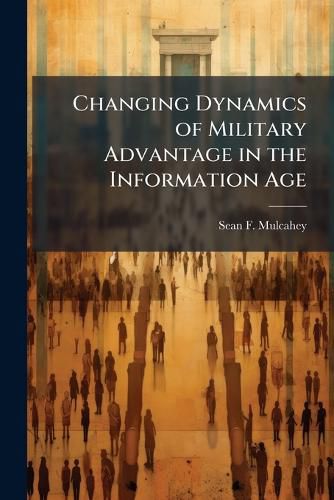Readings Newsletter
Become a Readings Member to make your shopping experience even easier.
Sign in or sign up for free!
You’re not far away from qualifying for FREE standard shipping within Australia
You’ve qualified for FREE standard shipping within Australia
The cart is loading…






This title is printed to order. This book may have been self-published. If so, we cannot guarantee the quality of the content. In the main most books will have gone through the editing process however some may not. We therefore suggest that you be aware of this before ordering this book. If in doubt check either the author or publisher’s details as we are unable to accept any returns unless they are faulty. Please contact us if you have any questions.
The information revolution causes dramatic changes in the geopolitical environment, which result in new challenges to U.S. national security, particularly from a new form of global insurgency. The continued development and proliferation of information technology impacts the very nature of conflict and military competitive advantage. Can the U.S. expect to maintain its current unprecedented degree of military advantage in the information-age? This thesis examines this question using a qualitative research methodology. The research analyzes the impact of information technology on the geopolitical system, the nature of conflict, and the realm of military competition. Within this context, the research examines the changing nature of military advantage. Three elements of advantage are analyzed to determine qualitative changes that result from the changing conditions of the information-age. The elements are power, legitimacy, and effects. The research also includes a comparative analysis that seeks to determine how these changing conditions affect the ability of both the U.S. military and global insurgents to gain advantage. The research concludes that U.S. military advantage will decline relative to a global insurgency. As a result, the U.S. will face significant challenges in its effort to achieve lasting success in the Global War on Terrorism (GWOT).
This work has been selected by scholars as being culturally important, and is part of the knowledge base of civilization as we know it. This work was reproduced from the original artifact, and remains as true to the original work as possible. Therefore, you will see the original copyright references, library stamps (as most of these works have been housed in our most important libraries around the world), and other notations in the work.
This work is in the public domain in the United States of America, and possibly other nations. Within the United States, you may freely copy and distribute this work, as no entity (individual or corporate) has a copyright on the body of the work.
As a reproduction of a historical artifact, this work may contain missing or blurred pages, poor pictures, errant marks, etc. Scholars believe, and we concur, that this work is important enough to be preserved, reproduced, and made generally available to the public. We appreciate your support of the preservation process, and thank you for being an important part of keeping this knowledge alive and relevant.
$9.00 standard shipping within Australia
FREE standard shipping within Australia for orders over $100.00
Express & International shipping calculated at checkout
This title is printed to order. This book may have been self-published. If so, we cannot guarantee the quality of the content. In the main most books will have gone through the editing process however some may not. We therefore suggest that you be aware of this before ordering this book. If in doubt check either the author or publisher’s details as we are unable to accept any returns unless they are faulty. Please contact us if you have any questions.
The information revolution causes dramatic changes in the geopolitical environment, which result in new challenges to U.S. national security, particularly from a new form of global insurgency. The continued development and proliferation of information technology impacts the very nature of conflict and military competitive advantage. Can the U.S. expect to maintain its current unprecedented degree of military advantage in the information-age? This thesis examines this question using a qualitative research methodology. The research analyzes the impact of information technology on the geopolitical system, the nature of conflict, and the realm of military competition. Within this context, the research examines the changing nature of military advantage. Three elements of advantage are analyzed to determine qualitative changes that result from the changing conditions of the information-age. The elements are power, legitimacy, and effects. The research also includes a comparative analysis that seeks to determine how these changing conditions affect the ability of both the U.S. military and global insurgents to gain advantage. The research concludes that U.S. military advantage will decline relative to a global insurgency. As a result, the U.S. will face significant challenges in its effort to achieve lasting success in the Global War on Terrorism (GWOT).
This work has been selected by scholars as being culturally important, and is part of the knowledge base of civilization as we know it. This work was reproduced from the original artifact, and remains as true to the original work as possible. Therefore, you will see the original copyright references, library stamps (as most of these works have been housed in our most important libraries around the world), and other notations in the work.
This work is in the public domain in the United States of America, and possibly other nations. Within the United States, you may freely copy and distribute this work, as no entity (individual or corporate) has a copyright on the body of the work.
As a reproduction of a historical artifact, this work may contain missing or blurred pages, poor pictures, errant marks, etc. Scholars believe, and we concur, that this work is important enough to be preserved, reproduced, and made generally available to the public. We appreciate your support of the preservation process, and thank you for being an important part of keeping this knowledge alive and relevant.